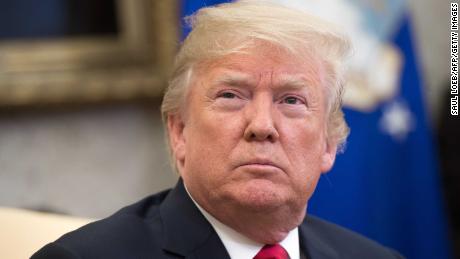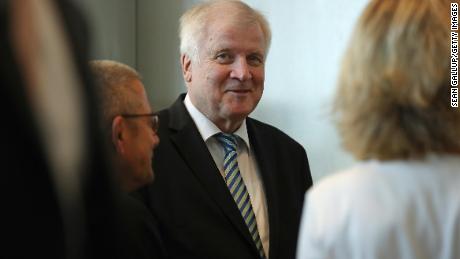Berlin (CNN)German Chancellor Angela Merkel was given two weeks Monday to agree a new migration policy with European leaders or face a renewed rebellion from her own government that is threatening to bring her 13-year rule to an end.
The architect of the division is her interior minister, Horst Seehofer of the Christian Social Union (CSU) -- the Bavarian sister party to Merkel's own Christian Democratic Union (CDU).
Seehofer last week defied Merkel to announce a tough new immigration policy that would see some asylum seekers turned away at the borders of Germany. He had suggested he could implement the proposals unilaterally, in defiance of both European regulations and the chancellor.
But Merkel announced Monday that the two parties have agreed that she will seek to reach bilateral agreements in the next two weeks with other European Union leaders to allow Germany to turn back asylum seekers at the border, and nullify any need for unilateral action.
On July 1, after the completion of a two-day EU summit, Merkel will meet with the CDU executive to discuss next steps, the chancellor said Monday.
In a statement released Monday, the CSU said that an immediate ban on entry will be implemented for people who have previously been refused residence in Germany and that further rejections would begin in two weeks if Merkel was unable to broker the desired agreements.
"The rejections will take effect from the first week of July at the latest if no effective results are achieved at the upcoming EU summit," the statement said.
Merkel insisted Monday that the CSU and CDU have the same goal -- to better control immigration -- but that it was an issue that can only be resolved on the European level. She also acknowledged the difficulty of the task ahead: "I am under pressure now, and those who know Europe know that this is not easy."
Seehofer's "migration master plan," which Merkel last week refused to endorse, would see asylum seekers arriving at Germany's borders turned away if they have no identification papers, have already had an asylum claim rejected in Germany, or are already registered in another country in the EU -- proposals that rights group say contravene European and international agreements.
Merkel said Monday that she agreed with 62 of the 63 proposals in the plan, which has not yet been published in full.
Seehofer, whose party is more socially conservative than Merkel's, has long been a critic of the chancellor's immigration policies, particularly her decision to open Germany's borders at the height of the refugee crisis in 2015.
But after the pair agreed last October to try to limit Germany's refugee intake to 200,000 a year -- a policy Seehofer had long called for and Merkel had previously ruled out -- tensions seemed to fade.
Critics see Seehofer's maneuvering as an attempt to burnish his party's right-wing credentials ahead of Bavarian state elections in October. The CSU lost thousands of voters to the far-right Alternative for Germany (AfD) party in federal elections last year, and is fearful of further losses.
End of the road for Merkel?
Merkel, who has led Europe's largest economy since 2005, was widely seen as unassailable in the run-up to elections last September.
But both the CDU/CSU alliance and the Social Democrats (SPD) -- the country's two mainstream parties -- suffered big losses on the night and Merkel struggled to form a coalition, finally reaching an agreement between the parties in March this year.
Her position as chancellor is now in question, but it remains unclear precisely how the situation will develop.
If the split over migration deepens and Merkel fires Seehofer, that could lead to a split in the CDU/CSU union which may in turn trigger a vote of no confidence and a possible end to Merkel's tenure.
Alternatively, if the CSU splits from the CDU and becomes an opposition party, the governing coalition would be left with 353 seats, one short of a majority, potentially triggering the collapse of the government.
How did we get here?
Merkel's comments on Monday followed a week of rising tensions within the CDU/CSU alliance after the interior minister first floated his "master plan."
His proposals were a surprise to many -- a few months ago, Seehofer appeared to rule out rejecting people at the border, calling at the time for detention centers to house asylum seekers while their claims were processed.
Speaking Thursday, Merkel described the plan as "a good and important project," but insisted that migration was an EU-wide challenge and that Germany "should not act unilaterally" or "at the expense of third parties."
She promised to pursue bilateral agreements on the distribution of asylum seekers as she meets with European leaders ahead of the EU summit at the end of the month.
Merkel was due to meet with Italy's newly-minted Prime Minister Giuseppe Conte on Monday, and the following day with French President Emmanuel Macron.
Her approach has the backing of most CDU and SPD lawmakers. Pictures appeared on Twitter Sunday of the EU flag flying above the SPD headquarters in Berlin, rather than the national ensign.
On Monday the foreign affairs minister, SPD lawmaker Heiko Maas, tweeted a strong defense of Merkel and a Europe-wide response to migration: "The EU stands for a promise that has made Europe a place of longing worldwide. If we want to defend our liberal democracy, we need more Europe, not less."
But the chancellor's pledge has been met with skepticism by some CSU politicians, who question the possibility of reaching an EU-wide agreement after several years of failed attempts.
The prospects of Merkel reaching a deal on migration with Conte on Monday would appear slim. Italy's new populist government -- made up of the anti-establishment Five Star Movement and the anti-immigrant League party -- is taking a hard line on migration and has already begun turning away boats of migrants from its ports.
According to the Institute for Human Rights in Berlin, Seehofer's proposals violate Germany's European and human-rights obligations. The Geneva Refugee Convention, to which Germany is a signatory, guarantees every person seeking protection against human-rights violations the right to an asylum procedure, regardless of whether they have identification papers or not.
Furthermore, although asylum seekers registered in another EU country do not have the right to claim asylum in Germany under German law, that legislation is superseded by EU rules, which stipulate that every EU country must check which state is responsible for an asylum seeker, rather than sending him or her back across the border.








